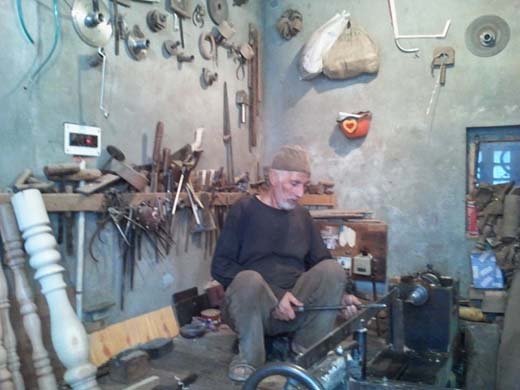There was a time when his handmade wooden bangles would find takers in German markets. Sehar Qazi meets the artisan who finds it hard to survive after foreigner tourists abandoned Kashmir

Mohd Sultan Najar was just 16 year old when he started his journey of carving things out of the wood in Kashmir.
Now 70, Najar is fighting an indecisive battle to end his journey with wood.
Reason? As an artisan, he finds it hard to earn money out of this profession. “I simply want to shut down my workshop and put the place on rent. That way at least I can earn something,” says Najar in a tone full of pessimism.
Najar starts his days work with a cigarette. Puffing heavily, the stress of not getting his work noticed despite hard work is visible on his face.
Inside the workshop, a variety of polished salt bowls are laid on top of each other. In another corner, double layered mortars and pestles, pen holders, tables, nut crackers lay covered with white sheets waiting for the lovers of art and craft.
During his heydays as an artisan, Najar enjoyed and earned good money from his work. “I used to sell wooden items to showroom owners across Srinagar. Some of the known businessmen who used to buy my items were Ghulam Mohammad Chako and Ghulam Mohammad Shah,” says Najar proudly.
At that time, when wood work was still a profitable profession, Najar’s two brothers used to work with him. “We used to make wooden bangles and send them to designer at different places in Kashmir. Our wooden bangles were exported to Germany even. The price varied according to the size of the bangles. We used to earn good amount of money but then suddenly customers stopped showing up,” recalls Najar while looking at a set of tools hung behind him on the wall. “They are all my hathyar (tools).”
Now sitting alone in his worn-out workshop, walls of which he has decorated with the photographs of his family, friends, worker, Najar’s says his hard work earns him nothing. “My conscience doesn’t allow me to be dependent on anybody in my family,” says Najar.
Ask him the reason for such a nosedive in sales in last few years and Najar is quick to blames the ongoing conflict. “yeneh yeh jung logh, tane tavekh esh behneveth (since insurgency started in Kashmir, we lost our livelihood)”.
There has been a steep fall in orders as foot fall of foreign tourists decreased in Kashmir, feels Najar.
Najar who hails from Roshan Nagar Mohalla of Nowhatta area in Srinagar loves to recall his childhood days. “I miss those golden days of my life. I was like a free bird then. Without a worry in the world,” recalls Najar. “I have studied at a Jabrie Sakool (forced school introduced by Maharaja Hari Singh), where Pandits used to teach us,” says Najar.
Najar doesn’t remember when he left his studies, but says he started working at his father’s workshop from an early age along with his three brothers. “My father was an expert in houseboat making. Though I used to help him out with the process but only my younger brother could pick the skill. Rest of us learnt walnut wood work,” says Najar.
Without any big orders at his hand now, Najar spends most of the time reminiscing about his past. “You know I got married at the age of 20. And during those days bridegrooms would go on a horse with musical band in toe. One had to book both horse and musical band in advance from Amira Kadal,” says Najar. “People used to call such bridegrooms: bajeh mahraaj. It was simple”.
But things have changed a lot since the start of arms insurgency in Kashmir, says Najar. “Nowhatta, the place I live has seen the worst of insurgency and counter-insurgency during 90s,” says Najar.
One memory that Najar wishes to forget is from early 90s when army used to drag people out of their houses before dawn, and keep them in a line for identification parade, known in local parlance as crackdowns. “We were treated like animals,” says Najar. “Those were the darkest times we have lived through. Thousands of youngsters were killed, disappeared, tortured and handicapped,” says Najar in a voice full of pain.
“Nowhatta used to be a lively place with smiling faces all around in our childhood. Now the same streets are full of widows and half widows,” he says.
The constant noise of vehicles passing by his workshop brings him back to the present times and he takes a deep look at a room full of finished but unsold goods. “I have made them a long time ago but there are no customers,” says Najar.
Najar survives by making wooden railings for newly constructed houses. “I am left with this work only,” says Najar.
A few days back Najar visited one of the showroom owners in Srinagar’s business hub Lal Chowk, with samples of his work hoping to fetch a deal. “The showroom owner, with whom I had previously worked, said he had not sold anything substantial since last 8 months from his shop. He too is planning to change his profession,” says Najar disappointedly.
Najar vividly recalls his visits outside the valley during his golden days as an artisan. “I visited many Indian states with the businessman who used to sell my products. There I met many foreign clients who would give me a one dollar bill as a token of appreciation for my work,” recalls Najar.
Before lighting another cigarette Najar playfully brings forth his right arm exposing a tattoo of a crescent, and another one, a flower on the back of his right hand. “I used to hide this crescent while travelling outside Kashmir.”














